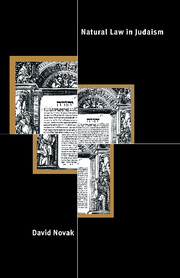1 - The challenge of modern secularity
Published online by Cambridge University Press: 28 October 2009
Summary
How do we sing the Lord's song on strange soil?
(Psalms 137:4)THE HISTORICAL LOCATION OF THE QUESTION
Any normative question asked by contemporary Jews must be seen in the context of Jewish modernity. Jewish modernity has been largely determined by three momentous experiences: (1) the acquisition of citizenship by Jews as individuals in modern, secular nation-states; (2) the destruction of one third of Jewry in the Holocaust; (3) the establishment of the State of Israel. If natural law be initially defined as those norms of human conduct that are universally valid and discernible by all rational persons, then the question of “natural law,” by whatever name it happens to be called, is inherently involved in all three of these momentous experiences. That is because all three of them are essentially political, and the question of natural law is essential to political thought.
The acquisition of citizenship by Jews as individuals in modern, secular nation-states has been a seismic change from the political situation of Jews in the Middle Ages. During the Middle Ages, Jews were members of a semi-independent polity within a larger polity. The political status of the Jewish communities was determined by some sort of contract with the larger, host societies by which they were allowed to live, as it were, as imperium in imperio. Since these larger, host societies, being either Christian or Muslim, were religiously constituted just as the Jewish community was, the relationship of the Jewish communities with them was largely determined by religious criteria.
- Type
- Chapter
- Information
- Natural Law in Judaism , pp. 1 - 26Publisher: Cambridge University PressPrint publication year: 1998



